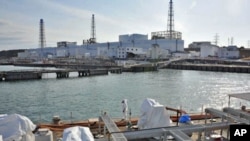In the wake of the Fukushima Daiichi nuclear power plant disaster in Japan a year ago, experts have been questioning whether nuclear power can be developed economically and managed safely in the face of unpredictable natural events.
The power plant was designed to withstand the largest tsunami ever to hit Japan, a 1960 event linked to a 9.5 magnitude earthquake in Chile, the largest earthquake in recorded history.
The earthquake that struck Japan last March was a magnitude 9.0. It set off a tsunami that crippled the Fukushima plant, killing 20,000 people and displacing 340,000 more. The plant suffered a partial meltdown and released potentially dangerous radiation over a wide area
Underestimating the danger
Thorne Lay, a seismologist with the University of California Santa Cruz, says the chances that a great wave could shut down the emergency backup systems at the power plant were underestimated.
“There are things we could do better.That is often the case with very complex technical systems that we build and don’t anticipate all the failure points.” For example, he says, “The project could have been engineered with backup power at very high elevations so that it could not possibly get drowned out.”
The Japan earthquake was one of a series of large quakes around the world in recent years. From them, scientists have learned that one quake can closely follow another, that they can occur in shallow parts of faults and not just in deep waters, and that they can occur across an ocean ridge.
Scientists now understand more about how and where earthquakes occur. But despite its growing ability to anticipate risk in certain regions, science cannot provide decision makers with all the answers.
“What people have to do if they live in areas with earthquake potential is recognize that scientists are going to do their best to identify the long-term shaking hazard that guides engineering and construction standards," Lay says. "We will try to our best to give early warning if that’s possible and set up emergency response systems, but ultimately individuals need to prepare themselves.”
Rethinking economics of nuclear power
Safety is just one concern for the nuclear power industry.
Since the Chernobyl nuclear accident in Russia in 1986, nations have been rethinking the economics of nuclear power, says Peter Bradford, a former member of the U.S. Nuclear Regulatory Commission.
The cost of building a nuclear plant and generating electricity from it is much higher than other sources of power.
“New nuclear just hasn’t been able to compete in the power markets," says Bradford. "Investors just won’t take the risk of somehow being able to make money by selling 12-cent kilowatt hours in a five or six-cent market.”
The price of natural gas in some areas is that low and in addition, Bradford says, the demand for electricity has fallen.
“When you add to that the fact that the public has now seen several reactors blow up on their television screens, politicians have seen the fall of Japanese government, largely as a result of the accident, thousands of people being unable to return to their homes and liability estimates that start at $100 billion. That certainly has made the nuclear case even harder to make.”
Building new reactors
But a new plant is under construction in the U.S. state of Georgia, the country’s first since the 1979 Three Mile Island nuclear disaster in Pennsylvania. The costs will be passed on to customers.
Even if that plant is built on time and on budget, Bradford says, it is still a recipe for going broke, given the current power market. But, he points out, that doesn’t mean nuclear can’t and isn’t working elsewhere.
“The Chinese, for example, are still building, a substantial number of new reactors. That’s really the paradigm, the only paradigm that can still work for new nuclear is a strong central government that is committed to making the public pay, either as taxpayers or as customers.”
For some, nuclear power is justified by its primary virtue: it is clean energy. The problem is balancing that virtue against the financial and environmental risks.
The role for nuclear in the energy power marketplace and how it can be managed safely will be on the agenda later this month when world leaders gather at the Nuclear Security Summit in Seoul, South Korea.









